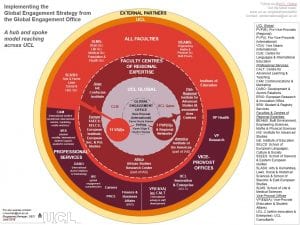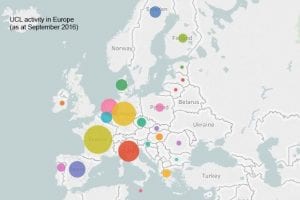Ask GEO: Rachel Corcoran, Programme Manager
By Sophie Vinter, on 22 September 2016
 Rachel is GEO’s Programme Manager. We asked her to tell us more about her role and the recently launched Global Engagement Funds.
Rachel is GEO’s Programme Manager. We asked her to tell us more about her role and the recently launched Global Engagement Funds.
What is your role in GEO?
UCL’s Global Engagement Strategy launched in May last year – it’s an ambitious strategy which sets out a number of objectives: from ramping up the university’s collaborations with institutions abroad, to increasing student mobility and raising UCL’s global profile, to name a few.
As with any strategy, it’s all well and good deciding what you want to achieve, but the more difficult part is in the delivery. In UCL’s case, my office, the GEO, has a team dedicated to partnership development, with much of the other activity actually delivered by lots of other departments across the university – a ‘hub and spoke’ model (see image below), with GEO as the ‘hub’.
As Programme Manager, my role is to be a central point of oversight – to plan, monitor and evaluate success, ensuring that progress against objectives across UCL is captured in one place, identifying areas of overlap between different initiatives and supporting delivery offices where needed.
One part of the strategy which I specifically work on is managing the funding to academics to develop their overseas collaborations – recently I was pleased to launch the second year of the Global Engagement Funds.
 What are the Global Engagement Funds for?
What are the Global Engagement Funds for?
Global Engagement Funds cover the costs associated with UCL academics collaborating with higher education institutions, organisations or companies abroad. The aim is to facilitate activity for which there might not be another funding source, but which could be the start of an exciting new initiative.
There were some fascinating projects last year – I remember there was one from Archaeology, involving a researcher partnering with a Dutch NGO to tackle the black market in looted antiquities from Iraq and Syria, through jointly building a database of such objects. Or the lecturer from the Institute for Global Health who funded travel to Kigali to work with the University of Rwanda on the prevention of gender-based violence – including a joint seminar, meetings with key individuals, and visits to potential field sites, with a view to writing a grant proposal.
I’m not part of the decision-making though – the panels are led by Vice-Deans International (VDIs) and regional Pro-Vice-Provosts (PVPRs).
What is the role of the VDIs and PVPRs in the wider strategy?
The PVPRs play an important strategic role as a catalyst for UCL’s engagement in their particular region. Each term they chair the Regional Network meeting; they welcome international delegations to UCL and act as ambassadors for UCL abroad.
While the PVPRs focus on a specific region spanning all of UCL’s faculties, the role of the VDIs spans all regions in a particular faculty. They are a point of contact for academics and work with the Dean to ensure that the faculty’s global partnerships (e.g. teaching, research, consultancy, knowledge transfer) are in line with the wider strategy.
 How do you think the vote for Brexit has impacted on UCL’s plans for global engagement?
How do you think the vote for Brexit has impacted on UCL’s plans for global engagement?
I think that it just shows that it is now more important than ever that UCL remains open and engaged with the world, sending a clear message to our partners (see my colleague Conor’s comments). As our Vice-Provost (International) says, we are redoubling our efforts to meet those objectives set out in the strategy, especially with regard to Europe, one of the regions where we have a significant amount of activity.
Not only that, but I am excited to be part of reviewing, in the light of the Brexit vote, the way in which we intend to go about achieving objectives.
 Close
Close

